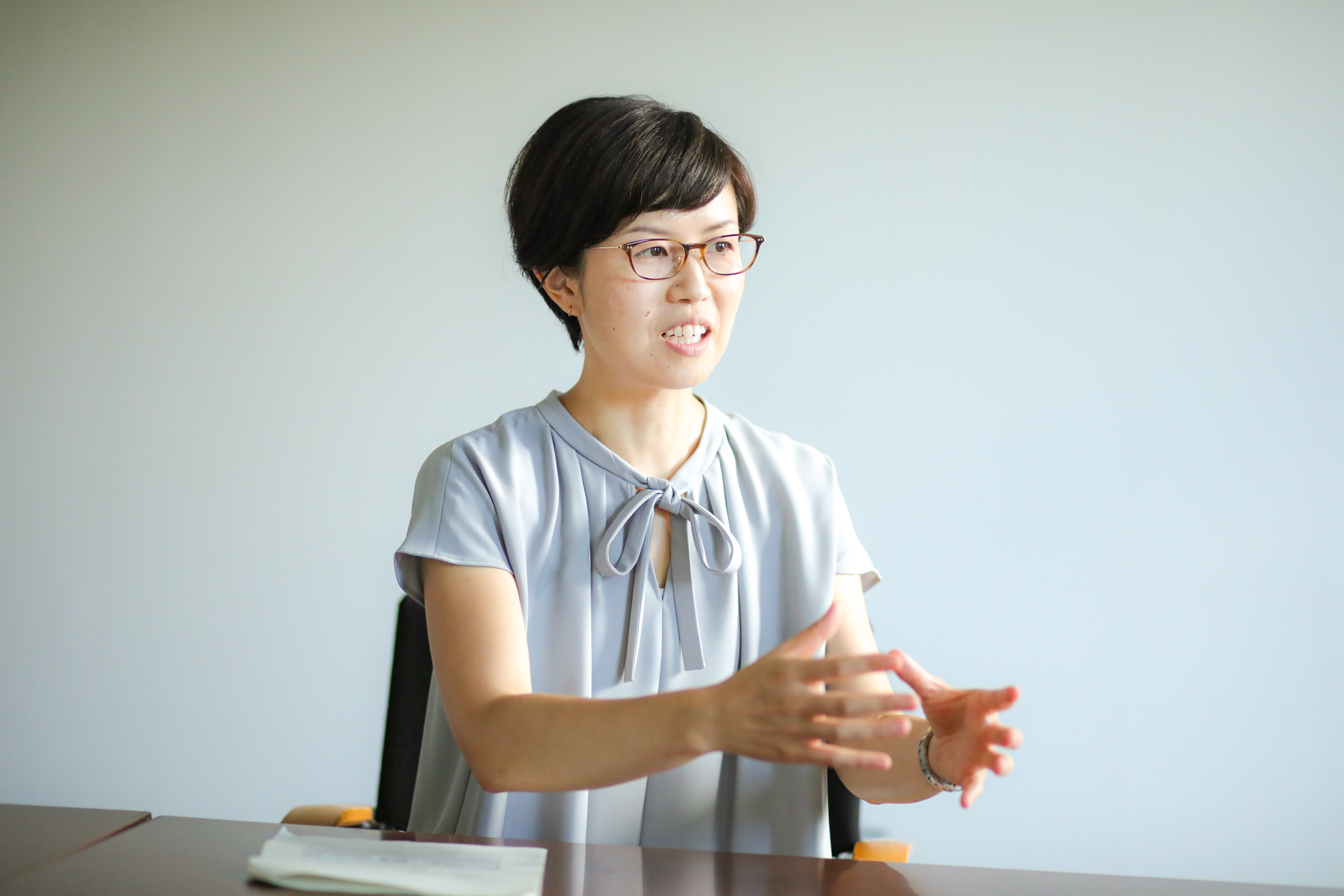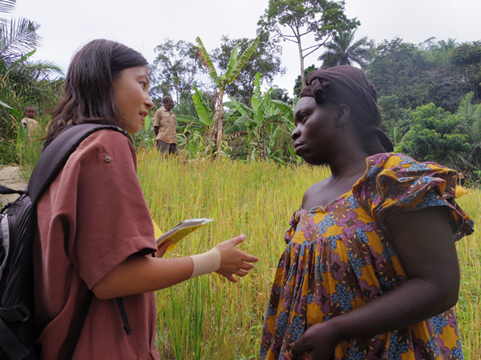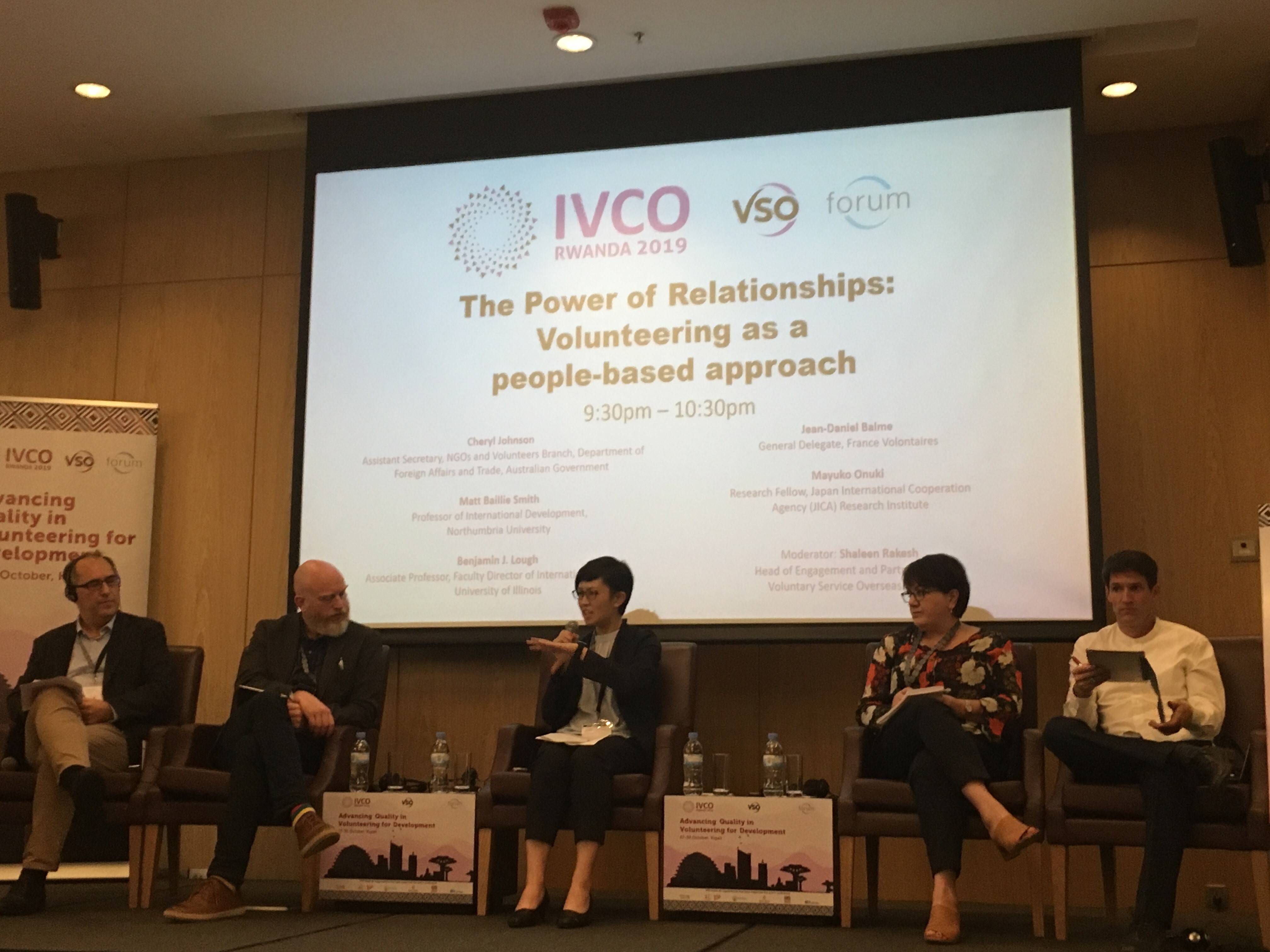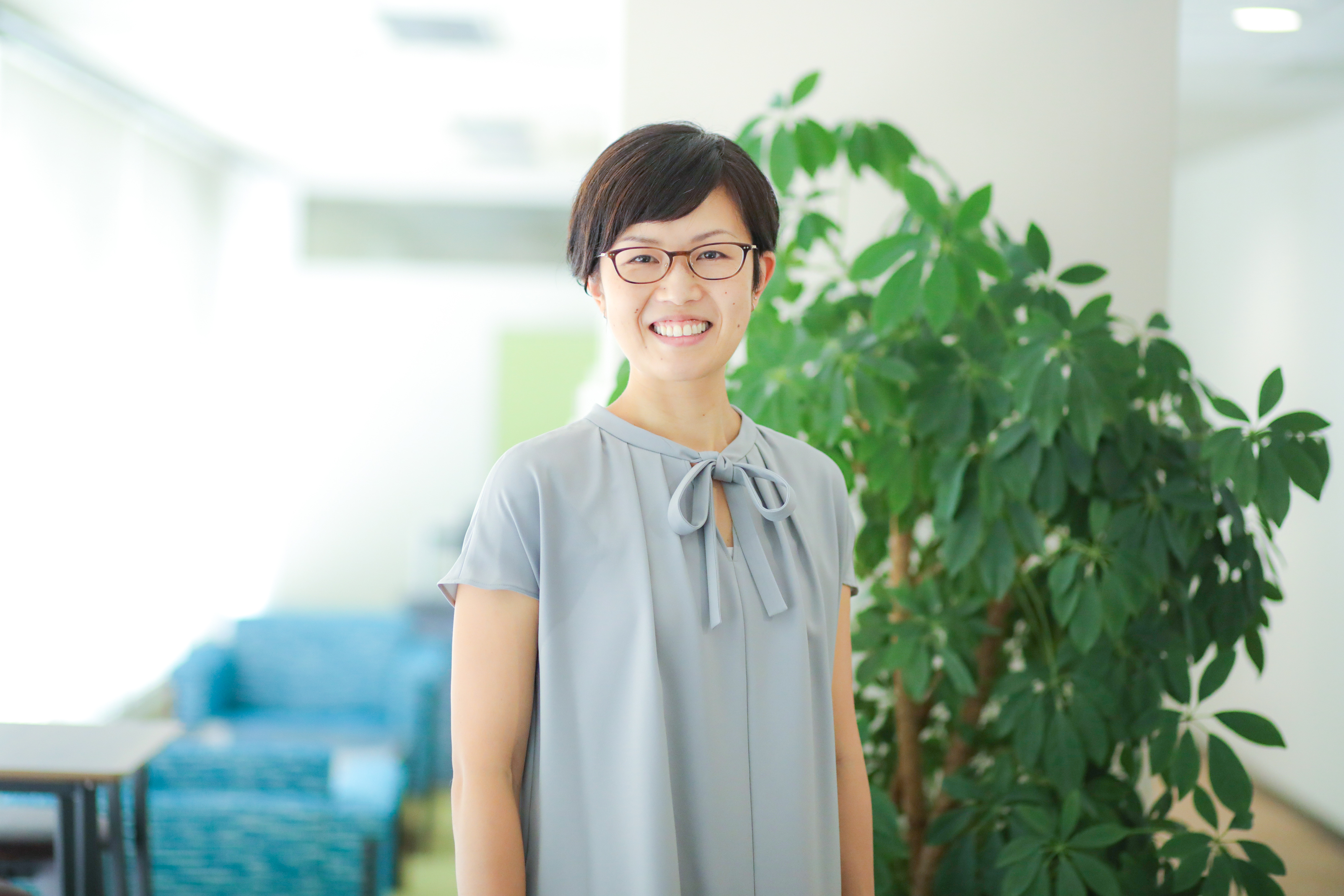Exploring the Achievements and Significance of JICA Volunteers from the Perspective of Social Psychology: An Interview With Onuki Mayuko of Waseda University
2024.07.16
The JICA Volunteer Program is JICA’s signature program. By collaborating with researchers in various fields, the JICA Ogata Sadako Research Institute for Peace and Development (the JICA Ogata Research Institute) is analyzing the achievements and significance of the JICA Volunteer Program—which has a history of more than 50 years—from multiple angles, based on surveys targeting current and former JICA volunteers. Onuki Mayuko, who used to be a research fellow at the JICA Ogata Research Institute and now teaches at Waseda University, has particularly brought in new perspectives to this work as a social psychologist. We asked her what made her participate in the study on the JICA Volunteer Program and her thoughts on it.

Onuki Mayuko, assistant professor at the Graduate School of Asia-Pacific Studies, Waseda University, is involved in the study on the JICA Volunteer Program.
Onuki started to participate in the research project “An Interdisciplinary Study of Japan Overseas Cooperation Volunteers (JOCV)” in 2015 as a research fellow at the JICA Ogata Research Institute (which was called the JICA Research Institute at the time). She looks back and says that when she applied for the researcher position, she did not think that she would be working on the JOCV Program
[1]
at all.
As a social psychologist, Onuki was studying the mechanisms behind discrimination and conflicts between groups at the time. She applied for the position because of her interest in the JICA Research Institute’s publicly shared research data on inequality and conflicts in Africa and thought that her work can help. However, the institute presented data from a survey that targeted JOCVs in the research project “An Interdisciplinary Study of Japan Overseas Cooperation Volunteers (JOCV),” which was already ongoing. Onuki was then asked what kind of study she would conduct if she had these data.
Onuki says that when she saw the actual data, her intuition told her that she would be able to conduct an interesting study with her knowledge in social psychology and skills in quantitative analysis. She was also fascinated by the significance of studying JOCVs who work on problem solving in developing countries.
A total of approximately 3,500 JOCVs responded to this survey, before, during and after their missions. There was a questionnaire with about 50 questions, including those on the reasons and motives for applying and level of interest in volunteering work after returning to Japan. Research work to quantitatively analyze the survey results to objectively and systematically capture the trends within the overall JOCV community was already being conducted by the JICA Ogata Research Institute then, but to be able to gain even more findings, the institute recruited Onuki, who had the necessary skills. Onuki herself was keen on applying psychology, which had developed based on WEIRD (Western Educated Industrialized Rich Democratic) samples, to data on developing countries.
Onuki says without hesitation that her interest in JOCVs “doubled” when she started her research work. She says it was important that a lot of her fellow researchers were former JOCVs, allowing her to listen to their accounts based on first-hand experience. In addition, by observing the work at the frontline during her field work when former JOCVs in Japan were participating in volunteering work to reconstruct areas afflicted by the Great East Japan Earthquake and Tsunami, Onuki was able to see how the JOCV Program influences their activities after they return to Japan.

A JOCV working in Cameroon
After listening to real voices of JOCVs in addition to studying the survey data, Onuki was able to reveal various trends. The survey does not exclusively extract successful cases. For example, the willingness to take initiative, cross-cultural communication and intrinsic motivation related to management among JOCVs showed an overall trend to temporarily drop in their first year abroad although they increased in the latter half of the second year. Furthermore, she was able to gain some evidence that shows that intrinsic motivation leads to the achievements made by JOCVs. Intrinsic motivation is the motivation to achieve something because of internal factors like interest and curiosity rather than external factors like rewards and good reputation.
[1] Volunteer programs were reorganized in 2018. Since then, Japan Overseas Cooperation Volunteers (JOCVs), Senior Volunteers and Japan Overseas Cooperation Volunteers for Nikkei Communities are collectively called JICA Volunteers.
Onuki is currently a member of the JICA Ogata Research Institute’s research project “Contributions of International Volunteers in Bringing Change to Developing Countries and Shaping a Global Civil Society.” Together with Professor Okabe Yasunobu, Tohoku University, the lead researcher in this project, she is using data from the JOCV survey to analyze the relationship between the outcomes of the volunteer work and the social capital (resources created from relationships between people) that is cultivated when JOCVs build relationships with various local people during their volunteer work.
In addition, this project will elucidate how JOCVs who have returned to Japan are leveraging the capacities that they gained through their volunteer work abroad to address global challenges faced by globalizing societies. Moreover, the project aims to look at how the significance of the JICA Volunteer Program itself is changing with time in order to recommend future roles of the program.
So far, research project members including Onuki have held seminars throughout Japan to report their research outcomes. They have also participated in the Annual Conference of International Volunteer Cooperation Organizations, a platform for implementing organizations of international volunteer work from different countries, relevant government officials, educational institutions and NGOs to discuss challenges around volunteer work and their solutions, to disseminate their research outcomes.
Onuki says that although the JICA Volunteer Program has the longest history of all programs of its kind in Asia and has a great pool of expertise as an international volunteer program, this has not been sufficiently shared with the world. She has often received requests to know more about the JICA Volunteer Program.
While literature on the JICA Volunteer Program exists in Japanese, not much is currently available in English. Aware of the loss caused by knowledge being forgotten and not shared with the world, Onuki and her colleagues are preparing a book in English titled “State-Sponsored International Voluntary Service: The Case of Japan Overseas Cooperation Volunteers” to share their research outcomes. This book shares a study that tracked what kind of volunteer work is currently being implemented at what level by former JOCVs who returned to Japan about a decade ago, focusing on the values held by former JOCVs and their personalities as factors at the individual level. Compared to average Japanese citizens, those who have experience as JOCVs were overwhelmingly participating more in volunteer work. This trend was particularly significant for volunteer work in the field of international cooperation. The book also reviews existing Japanese literature and JICA Volunteer Program evaluation reports, with the visualization of evidence in mind.

At the Annual Conference of International Volunteer Cooperation Organizations 2019 in Rwanda, Onuki (center) participates in a discussion on how volunteers build relationships with local communities and contribute to sustainable development.
As a social psychologist, the core of Onuki’s work is the exploration of human processes and their solutions, that is, to understand why humans are prejudiced and discriminate others, and how prejudice and discrimination can be eliminated. In addition to her research on international volunteers, through fieldwork in Cambodia, Onuki is also studying discrimination, prejudice and trust toward disabled people in countries impacted by conflicts. She looks at how conflicts can impact relationships of trust within different social groups and what kind of mechanisms can foster trust and eliminate discrimination and prejudice.
Onuki explains that there used to be very limited interaction between social psychology and the development cooperation field. She thinks that the collaboration with the JICA Ogata Research Institute has allowed her to gain a wider perspective, that is, to conduct studies that can help policies and practical work in development cooperation, thereby growing her professionally as a researcher. She would like to continue her research with developing countries and Japan going through globalization as her field, steadily accumulating evidence on challenges around social inclusion and intercultural cohesion while having an emphasis on interaction between different groups of people.

About Onuki Mayuko
Onuki has been an assistant professor at the Graduate School of Asia-Pacific Studies, Waseda University, since April 2020. In the past, she worked as a research fellow at the JICA Ogata Research Institute. Onuki has a PhD (Social Psychology) from the University of Southern California.

事業事前評価表(地球規模課題対応国際科学技術協力(SATREPS)).国際協力機構 地球環境部 . 防災第一チーム. 1.案件名.国 名: フィリピン共和国.

事業事前評価表(地球規模課題対応国際科学技術協力(SATREPS)).国際協力機構 地球環境部 . 防災第一チーム. 1.案件名.国 名: フィリピン共和国.

事業事前評価表(地球規模課題対応国際科学技術協力(SATREPS)).国際協力機構 地球環境部 . 防災第一チーム. 1.案件名.国 名: フィリピン共和国.

事業事前評価表(地球規模課題対応国際科学技術協力(SATREPS)).国際協力機構 地球環境部 . 防災第一チーム. 1.案件名.国 名: フィリピン共和国.

事業事前評価表(地球規模課題対応国際科学技術協力(SATREPS)).国際協力機構 地球環境部 . 防災第一チーム. 1.案件名.国 名: フィリピン共和国.
scroll